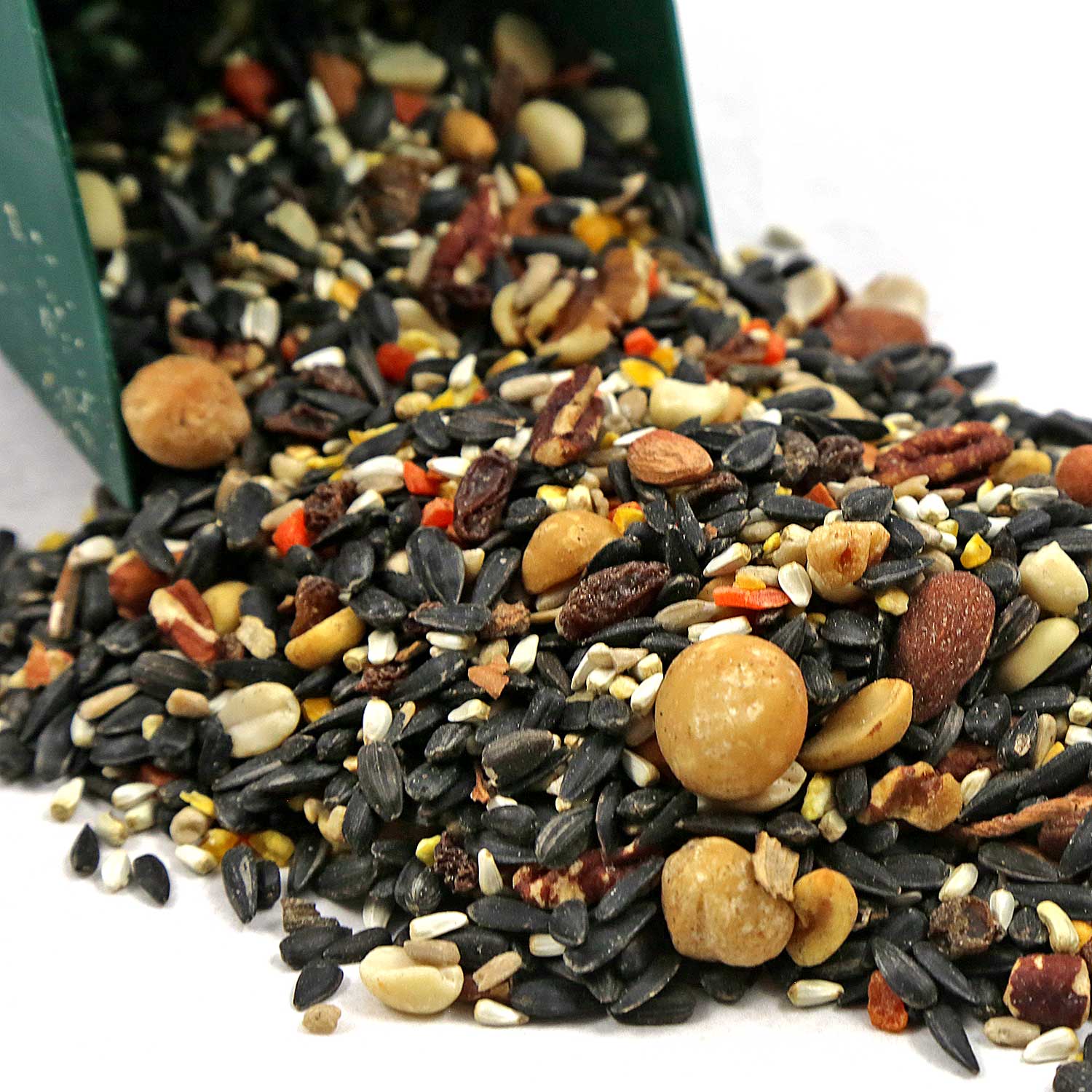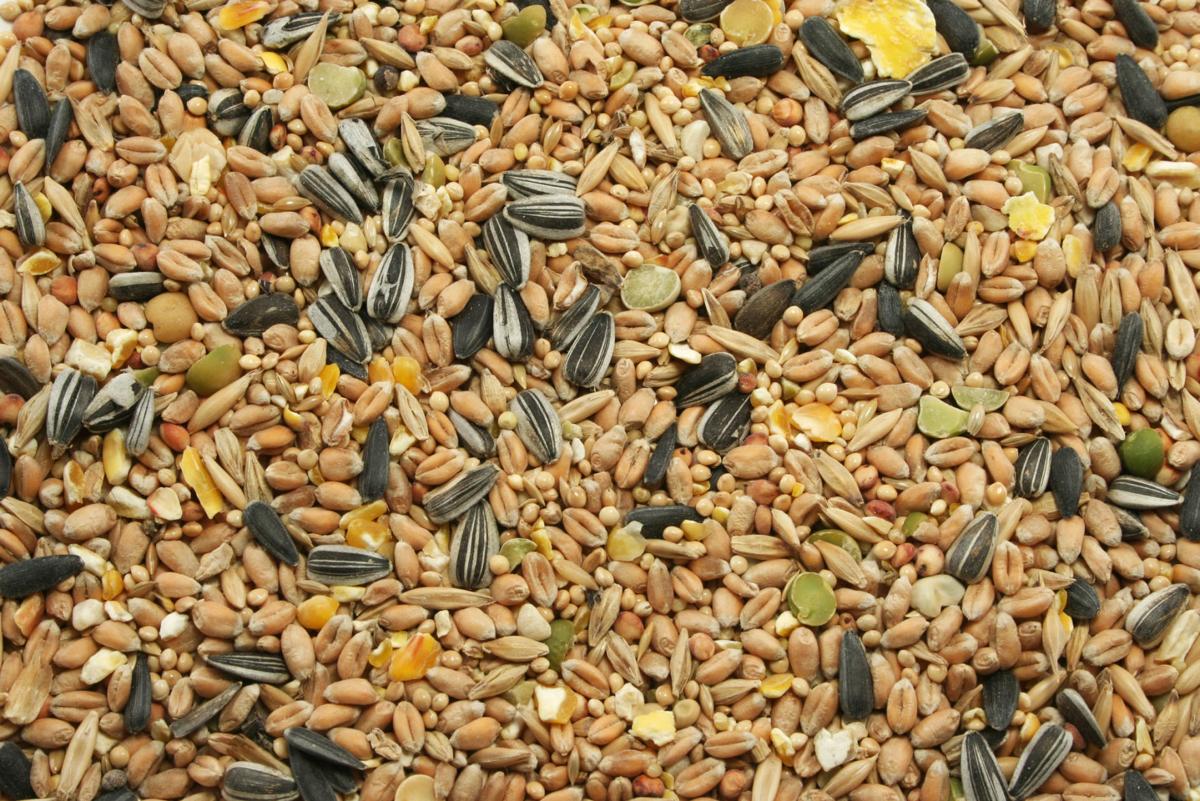Bird seed food is an essential part of any bird enthusiast’s repertoire. It provides the necessary nutrients and sustenance for our feathered friends, but it can also be a source of enjoyment and a way to connect with nature.
In this comprehensive guide, we’ll delve into the world of bird seed food, exploring its composition, nutritional value, types, storage, and environmental considerations. We’ll also provide tips on how to use bird seed as a hobby and create a bird-friendly environment.
Bird Seed Composition

Bird seed mixes are a convenient and nutritious way to provide essential nutrients to wild birds. They typically contain a variety of seeds that cater to the dietary needs of different bird species.
The composition of bird seed mixes can vary depending on the target bird species, region, and season. However, some of the most common types of seeds found in bird seed mixes include:
- Sunflower seeds:Rich in oil and protein, sunflower seeds are a favorite among many bird species, including cardinals, chickadees, and nuthatches.
- Safflower seeds:Safflower seeds are high in oil and low in carbohydrates, making them a good choice for birds that need to maintain a healthy weight.
- Nyjer seeds:Also known as thistle seeds, nyjer seeds are small and oil-rich, making them ideal for small birds like goldfinches and siskins.
- Milo seeds:Milo seeds are a type of sorghum that is high in carbohydrates and fiber. They are a good source of energy for birds that are active during the winter months.
- Cracked corn:Cracked corn is a good source of carbohydrates and is often used as a filler in bird seed mixes. However, it is not as nutritious as other types of seeds.
The nutritional value of different seed types can vary significantly. The following table compares the nutritional content of some of the most common types of seeds found in bird seed mixes:
| Seed Type | Protein (%) | Fat (%) | Carbohydrates (%) | Fiber (%) |
|---|---|---|---|---|
| Sunflower seeds | 20-25 | 45-55 | 15-20 | 5-10 |
| Safflower seeds | 15-20 | 55-65 | 10-15 | 5-10 |
| Nyjer seeds | 10-15 | 60-70 | 5-10 | 5-10 |
| Milo seeds | 10-15 | 30-40 | 40-50 | 10-15 |
| Cracked corn | 8-12 | 20-25 | 60-70 | 5-10 |
The size and shape of seeds can also be important factors to consider when choosing a bird seed mix. Smaller seeds are easier for small birds to eat, while larger seeds are better suited for larger birds. The shape of the seed can also affect how it is eaten.
For example, flat seeds are easier for birds to crack open than round seeds.
Bird seed food is a crucial part of keeping your feathered friends healthy and happy. However, if you’re looking for a salty snack to munch on while you watch your birds, be sure to check the salty snack food label carefully.
Some salty snacks contain high levels of sodium, which can be harmful to birds. Stick to bird seed food specifically designed for your feathered companions to ensure their well-being.
By understanding the composition and nutritional value of different seed types, you can choose a bird seed mix that is tailored to the needs of the birds in your area.
Nutritional Value

Bird seed is a crucial component of a balanced diet for birds, providing them with the essential nutrients they need to thrive. It is composed of various seed types, each contributing to a diverse nutritional profile.
Bird seed is rich in carbohydrates, which serve as a primary energy source for birds. These carbohydrates are primarily in the form of starch, which is broken down into glucose to fuel the bird’s body. Proteins are another vital nutrient found in bird seed, essential for growth, repair, and maintenance of body tissues.
Fats
Fats are also present in bird seed, providing a concentrated source of energy and aiding in the absorption of fat-soluble vitamins. Different types of seeds contain varying amounts and types of fats, contributing to the overall nutritional value of the seed mix.
Vitamins and Minerals
Bird seed is a valuable source of vitamins and minerals, which play crucial roles in bird health. Vitamins are organic compounds that are essential for various bodily functions, while minerals are inorganic elements that support bone health, metabolism, and other physiological processes.
Types of Bird Seed Mixes: Bird Seed Food
The wide variety of bird species necessitates the availability of diverse bird seed mixes tailored to their specific nutritional requirements. Understanding the distinctions between these mixes is crucial for selecting the optimal blend for your feathered friends.
Wild Bird Seed Mix, Bird seed food
Wild bird seed mixes cater to the dietary needs of various wild bird species, such as cardinals, chickadees, and finches. These mixes typically comprise a blend of sunflower seeds, safflower seeds, millet, and cracked corn. The high oil content of sunflower seeds provides energy, while safflower seeds are rich in protein and essential fatty acids.
Millet and cracked corn offer carbohydrates and fiber, respectively.
Parrot Seed Mix
Parrot seed mixes are specifically formulated for the nutritional requirements of parrots, including macaws, cockatoos, and African greys. These mixes typically include a variety of nuts, seeds, and pellets. Nuts, such as almonds and walnuts, provide essential fatty acids and protein.
Seeds, such as sunflower seeds and pumpkin seeds, offer energy and vitamins. Pellets are a convenient and balanced source of essential nutrients, ensuring a complete diet for parrots.
Finch Seed Mix
Finch seed mixes are designed for the specialized dietary needs of finches, such as zebra finches, canaries, and goldfinches. These mixes typically include a blend of small seeds, such as canary seed, niger seed, and flax seed. Canary seed provides carbohydrates and protein, while niger seed is rich in oil and essential fatty acids.
Flax seed offers fiber and omega-3 fatty acids, essential for maintaining healthy feathers and skin.
| Mix Type | Target Bird Species | Ingredients |
|---|---|---|
| Wild Bird Seed Mix | Cardinals, chickadees, finches | Sunflower seeds, safflower seeds, millet, cracked corn |
| Parrot Seed Mix | Macaws, cockatoos, African greys | Nuts (almonds, walnuts), seeds (sunflower seeds, pumpkin seeds), pellets |
| Finch Seed Mix | Zebra finches, canaries, goldfinches | Canary seed, niger seed, flax seed |
When selecting a bird seed mix, consider the following factors:
- The species of birds you wish to attract or feed
- The nutritional needs of the specific bird species
- The quality and freshness of the seed mix
- The size and type of bird feeder you are using
Final Review

Whether you’re a seasoned birdwatcher or just starting out, this guide will provide you with everything you need to know about bird seed food. So sit back, relax, and let’s dive into the fascinating world of bird seed.

